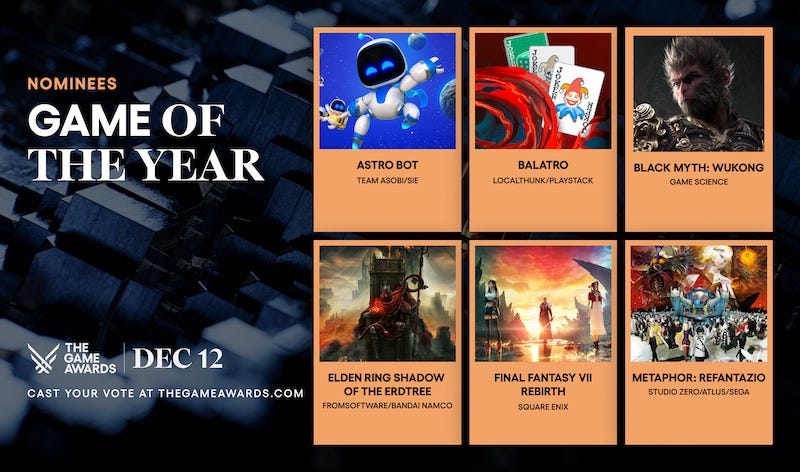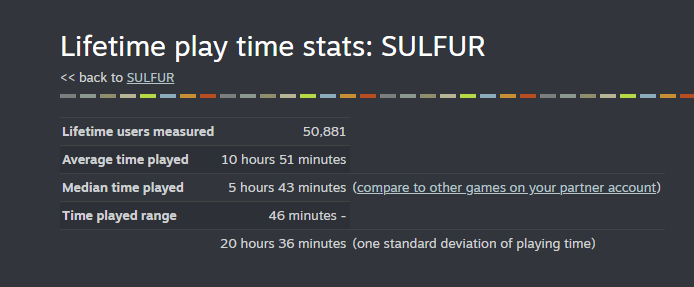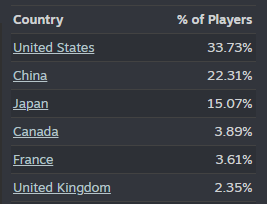How Sulfur sold 50k real fast - and the 'breakout indies' of Steam
Publikováno: 19.11.2024
Also: a whole heap of notable discovery news, duh.
[The GameDiscoverCo game discovery newsletter is written by ‘how people find your game’ expert & company founder Simon Carless, and is a regular look at how people discover and buy video games in the 2020s.]
Welcome back, kind newsletter readers, to ‘the week before Thanksgiving’ in the U.S. - and ‘the week before a non-descript week’ elsewhere. On that front, we briefly wondered why there’s no Thanksgiving-themed video games, given Daze Before Christmas handles Xmas, Costume Quest deals with Halloween, and the U.S. ain’t tiny.
Then we dug up Chicken Invaders 4’s Thanksgiving DLC, in which “the turkeys have constructed a gigantic cannon capable of launching planet-scale eggs against Earth”, and you lead “humanity's fight to regain control of Thanksgiving dinner against the rebellious turkeys and their army of allied intergalactic brethren.” (There’s a game about everything, folks!)
[FOR YOUR CONSIDERATION: support GameDiscoverCo by subscribing to GDCo Plus right now. You get base access to our ‘core’ Steam data back-end, full access to our second weekly newsletter, access to our lively Discord, eight game discovery eBooks & lots more.]
Game discovery news: The Game Awards noms..
Let’s start things out right with some game discovery and platform news, shall we? And it goes a little something like this:
Polygon has a handy run-down of the top Game Awards nominees, headed by Astro Bot, Balatro, Black Myth, Elden Ring’s DLC, FFVII Rebirth, and Metaphor: Refantazio for Game Of The Year. (Yes, that’s only one Western game…) And Ethan Gach’s newsletter has a lot of good meta-conversation about the TGAs.
GDCo’s latest list of ‘trending’ unreleased Steam games - by follower additions in the last 7 days - shows some notable trends, the Top 3 being S.T.A.L.K.E.R. 2 (out this week!), F2P title Paradise, and Path Of Exile 2, which just announced Advanced Access in late November and full release in early December.
Also notable in that ‘Steam trending’ list: Facepunch's fascinating Source 2 engine sandbox creator s&box (get it?) is at #5 after adding a Steam page., real-time tactics game Broken Arrow (#6) had a hot beta, and co-op roguelite shooter Rogue Point (#8) - from the Black Mesa creators - had a good-sized announce week.
Did you remember to do the German age rating questionnaire for all your Steam games? If not, they’re no longer available to buy there as of November 15th, and SteamDB’s xPaw says there are 45,000 (!) of them. (This compares to ~6,500 age restricted games in China right now, according to a GDCo Discord crewmember.)
In ‘platforms possibly buying content’ news, Sony is “in talks to acquire Kadokawa, the Japanese media powerhouse behind the ‘Elden Ring’ game”, according to Reuters. Kadokawa - which also does manga, anime, YouTube-ish site NicoNico & more, owns 70% of From Software, with Sony currently having 16% and Tencent 14%.
Brutal slash silly survival game Rust has continued to grow, and its exec producer revealed some stats: “Rust recently saw its strongest November [progress] wipe dayon record after nearly 11 years of development, 183k [Steam CCU] peak, 533k unique players.” Peak CCU in other years: 2015 = 27k, 2018 = 71k, 2021 = 120k, 2023 = 138k.
There’s some big titles coming to Xbox Game Pass over the next few days - in particular, S.T.A.L.K.E.R. 2 is a Day 1 Game Pass title (Xbox, PC, cloud), as is - more obviously - Microsoft Flight Simulator 2024. And there’s some Genshin Impact in-game goodies to celebrate the game’s Xbox launch on Nov. 20th.
Roblox is continuing to clean up child safety perceptions - in particular: “Users under the age of 13 will no longer be able to directly message others on Roblox outside of games or experiences”, and “By default, users younger than 13 will not be able to directly message others.” There’s also new content labels and enhanced parental controls.
Extra Phil Spencer interview insight? Firstly, the Xbox boss says game discovery is getting less formulaic:“It's less Excel now, and it's more [about] having a team of people that are really plugged into a lot of different signals… [players] are looking for trust signals of what to go play next.” And second, Xbox is doing “additional research” before it launches its (delayed) mobile store.
Capcom is extolling the benefits of ‘long tail’ margins in its latest financials: “They usually recoup a game’s development costs in about a year and a half after launch. After that, they expect a profit margin of 80 to 90% on a game, even if they reduce the retail price.” (Yes, but if your title doesn’t launch strong, it won’t make it to recoup.)
Microlinks: Meta has “quietly rolled out its premium digital currency” to Horizon Worlds; the example ‘using Teenage Mutant Ninja Turtles assets’ Fortnite experience is a roguelite side-scrolling beat ‘em up; a survey suggests couch co-op games could be under-supplied - we think online co-op with optional couch is far better?
How stripped-down FPS Sulfur hit 50k in 2 weeks!
While we sometimes feature the very biggest success stories here on GDCo, it’s also good to showcase pleasant, mid-sized hits from small teams, and try to ask - why did it happen, how much did it sell, and what can we learn from it?
And a stellar example of that is Perfect Random’s FPS x extraction shooter x roguelite mashup Sulfur($25). It was launched by its four-person dev team on October 28th, maxed out at a pleasant 2,800 Steam CCU, and is still hanging at >1k CCU three weeks after launch, implying a lot of replayability and general interest.
So we chatted to Perfect Random’s co-founder and CEO Anton Albiin, who revealed that the game has sold >50k units on Steam as of this time last week, with an impressive median playtime of almost 6 hours:
Sulfur launched with 160,000 wishlists, due to a lot of hustle from the game’s devs, and two pre-release demos - one back in March, with an update in June - being played by creators and players. Steam wishlists are now just over 250,000, with just under 29k of its 52k units being bought directly an already-wishlisted player account.
We were also interested to learn about the country breakdown of the title, which Anton revealed was slanted towards three countries in particular - especially notable given that Sulfur is available in 13 languages:
The U.S. and China generally have hefty percentages for everyone. But Japan all the way up at 15% is rare - GDCo’s data says the median ‘extraction shooter’ on Steam with >100,000 units sold has just 1.8% Japanese players. Anton told us the team spotted Japanese interest and even ran a .JP-localized Twitter account - impressive.
We’re probably not qualified to talk about why Japanese folks dig Sulfur (is it Wizardry’s fault? it’s always Wizardry’s fault!) But we can talk about why we think the game has succeeded in such a tough market:
The ‘extraction shooter’-adjacent angle was a slightly unintentional hook: at its heart, per Anton, Sulfur is “a roguelike with unpredictable runs and high replayability”, but “games like Tarkov influenced our approach to loot, weapon customization, and high-stakes gameplay.” So it’s not an extraction shooter, quite, but it’s also not not one…
The gunplay in Sulfur is particularly well-honed and visceral: with a few exceptions like Void Bastards, the first-person roguelite genre hasn’t massively taken off. But the ‘gun feel’, loading & reloading animations, and complex upgrade system in Sulfur are notably well-done and attractive to core shooter fans.
The art direction is a) good b) carefully calibrated for the game: Anton said the lo-fi look was “definitely a deliberate choice - balancing clean but a gritty.. aesthetic with stylized, muted colors. We were inspired by classic roguelikes and early shooters where detail didn't overpower readability, making every element clear in the chaos.”
Sometimes when you look at a game and it’s a mess of influences, you can feel that they didn’t quite gel right. But in Sulfur’s case, the devs cite everything from NetHack-influenced 2D roguelike IVAN (!) to games like Returnal and Dark Souls. And Sulfur feels like more than the sum of its parts.
If you look at the Top 5 medium ‘GDCo Affinity*’ games, they are: ZERO Sievert (2D extraction shooter), Void Bastards (first-person roguelite), Pacific Drive (first-person survival), Roboquest (first-person roguelite), and Magicraft (top-down ‘big in China’ roguelike.) [*’Sulfur players own these more than the median Steam player’]
And that feels like a coherent set of interests - with decent-selling games - that have created a market for Sulfur to flourish in. Of course, it’s easy to post-hoc rationalize success. Still, the game’s likely to sell >250k copies over time, not a slouch.
But we take and interpret all the data we can, to work out why a game performs. And we also noted that the team behind Sulfur spent a lot of time both honing and promoting it. Specifically, per Perfect Random’s Anton:
Iteration is key and the Sulfur team did a LOT of it:“We held several private testing phases, closed alphas, a closed beta with a few hundred testers, as well as a public demo... Each phase helped us improve loot balance, refine weapons, the cooking mechanics, and polish the roguelike loop.”
There wasn’t one single publicity push, but lots: “Our wishlist trajectory saw spikes during key events, like the PC Gaming Show and after certain streamers showcased the SULFUR Demo.” Anton also noted “word-of-mouth spread and the Steam algorithm” as helping - both Steam Discovery Queue traffic (22% of visits in the last week!), but also ‘recommendations by similarly tagged games’ on the Steam front page.
So there we are. We can’t tell you exactly why Sulfur is a hit, but we can say it was well-refined, in a good confluence of genres, and stood out in terms of gameplay, depth, and personality, despite its relatively lower-fi and small-team approach. Hurray!
A selection of Steam ‘breakout indies’, H2 2024…
It may be a sign of the times that when GDCo looks back over the latter half of 2024 to find PC indie games we consider to have ‘broken out’, we can only find ~ten, from the entire cast of thousands released in H2 so far, that we haven’t highlighted.
Still, we wanted to do a round-up of ‘probably no standalone article on it, but please go look at this game, because it really scaled nicely’. So we are featuring the following:
Mouthwashing($13, September debut, est. 200k sales, above) - this genuinely creepy ‘body horror’ first-person narrative game, set on a spaceship, is a great example of the ‘lo-fi horror’ trend, and has been played by some absolutely giant streamers.
Fields Of Mistria($14, August debut, est. 400k sales) - impeccably executed Harvest Moon-ish farming, exploring and friend-ing cozy game. It’s still in Early Access, but has so much love from the community - 98% Positive reviews on Steam, wow.
Elin ($20, November, est. 250k sales) - a solo dev, 15+ years in the making (!) spiritual sequel to cult Japanese roguelike Elona, this game has near-Dwarf Fortress levels of modeled detail, with isometric JRPG, crafting, building & more. Surprise hit?
UFO 50($25, September, est. 100k sales) - if you made Spelunky, you & your buddies could spend 7+ years making a giant 50-game compilation of clever, imagined titles from a fictional ‘80s game dev? (Amazing feat, non-replicable strategy.)
Age Of History 3 ($10, October, est. 170k sales) - can one person make a giant grand strategy game where you “journey through the entire saga of human civilization”? Turns out he can & did, more modestly priced and graphics-ed, but still fun/deep.
Lockdown Protocol ($10, July, est. 500k sales) - a first-person social deduction game - very much in the Among Us vein. It only went viral a few weeks after launch, but keeps selling, thanks to online co-op, word of mouth & streamers.
Similar to Lockdown Protocol, there’s also the three titles we highlighted in our Plus-exclusive newsletter a few weeks back - Dale & Dawson Stationery Supplies($8, Aug, 275k sales), Webfishing($5, Oct, 635k), and Liar’s Bar($7, Oct., 2.1 million). These are all online co-op led successes - two of them via social deduction gameplay.
What do all these games have in common? Relatively little, frankly. But many of them are cheaper-priced, laser-focused on a specific market, and have that special something that’s made them stand out. (One it’s not easy to predict from scratch?)
But still, if you were to tell us before release that these specific indies were hits, it’s probably only UFO 50 that we would be actively surprised by. Still, turns out execution trumps all, and Mossmouth and friends pulled it off! (Congrats to all.)
[We’re GameDiscoverCo, an agency based around one simple issue: how do players find, buy and enjoy your PC or console game? We run the newsletter you’re reading, and provide consulting services for publishers, funds, and other smart game industry folks.]


